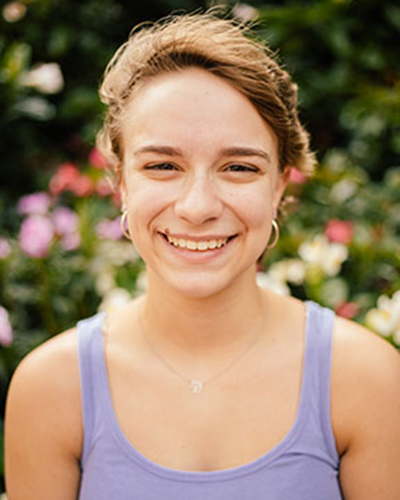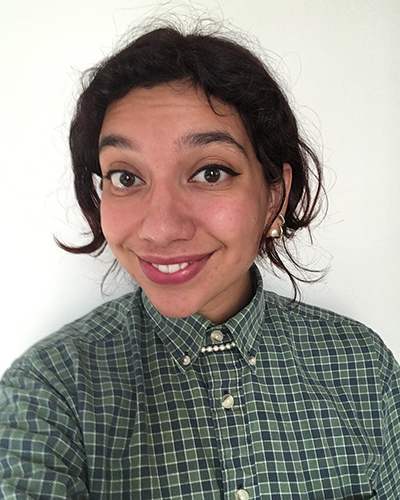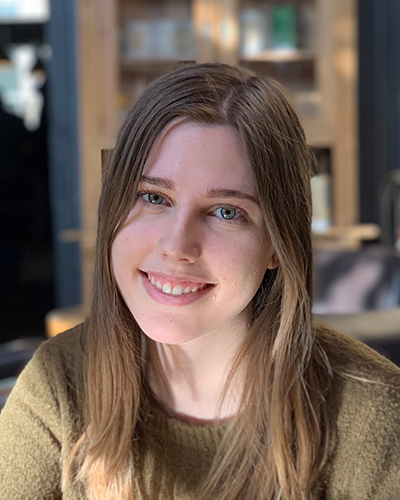The College of Arts, Media and Design (CAMD)’s James ‘66 and Jill Gabbe Creative Leader Scholarship provides financial support to undergraduate students in the College who seek to pursue a creative endeavor that will have a positive impact on the larger community. Funded projects take many different shapes and embrace creative solutions to tackle a wide range of challenges. This year’s recipients – Leif Fosse, Catherine Giorgetti, Isabella Greco, and Kayla Seikkula – are using production, theatre, architecture, and design to address climate change, gaps in the public school system, biodegradable waste, and the post-COVID restaurant industry.
“Jill and I are very impressed by and pleased with the way CAMD has put together and executed the Creative Leader Scholarship. It is precisely what we had anticipated it would be – and we are grateful to Northeastern for that,” said James Gabbe, SSH‘66, Senior Partner of CITIZENARTS. “The student projects are so imaginative. What better way to learn than by researching and coming up with creative ideas and shaping them into programs plans that will be beneficial to local communities in and around NU – and to the students themselves as they pursue their careers.”
Read more about each student project below.

Leif Fosse, who is studying Communications and Media and Screen Studies with a double minor in Psychology and Media Production, will be engaging Boston’s college communities to shift thinking about – and ultimately help combat – climate change. Leif plans to produce an interview-based documentary that features Boston’s students and professors. He plans to interview faculty members from prestigious Massachusetts universities who have a focus on sustainability and environmental issues, as well as professors with backgrounds in environmental law, communications, psychology, and science.
He also plans to interview students who have a focus and passion for sustainability. The goal is to leverage their expertise to showcase the immediate effect climate change is having, and highlight the importance and positive impact the Boston’s large and powerful college student population can have by taking action. This will help initiate a shift in the perception of the complexity of climate change.
Featuring these interviews, Leif hopes to produce a deliver a short documentary that will highlight the necessity for small daily changes that the student population can make, as well as the obligation this group has, to address the macro societal issues that have cemented climate change as overly complex and irreversible. He plans to emphasize the psychological aspects of addressing climate change and highlight the students in our Boston community that have already shown a commitment to implementing sustainability for a greener future. His faculty mentor is Michelle Carr, Senior Lecturer in the Department of Communication Studies.

Catherine Giorgetti, Theatre and History, is creating a piece of educational theatre that will work to fill some of the gaps in American public education – with the goal of making a positive, historical contribution for students. Her project was born out of her realization that her American public school education had many holes in it, and was based around the White American or White European experience. The purpose is to fill in some of the gaps so that students will have less to do themselves later. Theatre can help to make some of these topics more accessible to young learners.
Catherine is planning on working with a consultant, Tanya Nixon-Silberg of Little Uprisings, as well as a public elementary school in the Boston area. This project synthesizes her two majors, as well as her minor, playwriting, and her love of educational theatre. Through her research, she will land on a topic that schools are missing and start filling in some of the gaps that she has seen in her own past education. Her faculty mentor is Antonio Ocampo-Guzman, Associate Professor and Chair of the Department of Theatre.

Isabella Greco, Architecture, is researching ways to limit the massive amount of non-biodegradable waste that emerges from architectural design studios. Architecture students produce numerous models to study their designs. These models are not meant to last; they are often disposed of at the end of the semester, yet they are constructed of materials that may last for millennia. This challenge expands further than just the studio; there is waste in every type of “temporary architecture.” This architecture includes a variety of physical objects that designers use to understand and analyze their work, such as physical models and large-scale prototypes. However, this disposable form of progress is crucial to the overall design process in that designers need the ability to iterate through their ideas, and converting this to a digital format does not compare to the intricacies of tangible objects.
To explore solutions to this challenge, Isabella is experimenting with different materials and composites, aiming to keep them relatively inexpensive and readily available for accessibility purposes. She will test how the material behaves in nature outside over time, how it responds to different elements, temperatures, and precipitation, as well as its tensile strength and how it behaves compressively. She intends to experiment with laser cutting the material and researching its extrusion capabilities for 3D printing. Resulting from Isabella’s research, discarded materials can be reused or composted, producing cyclical materials. Her ultimate outcome is to create a material that works for her personal practice, as well as to create a blueprint for other designers. Her faculty mentor is Mary Hale, Assistant Teaching Professor in the School of Architecture.

Kayla Seikkula, Structural Engineering and Architectural Studies, is seeking to understand how neighborhoods and restaurants within Boston have responded to the new conditions, as well as health and social distancing requirements, associated with the COVID-19 pandemic. With a focus on outdoor dining, she hopes to provide a toolkit to help restaurant owners, particularly those who are underserved, navigate the changing urban landscape and maintain safe environments. She plans to gather data and interview restaurant owners – ultimately summarizing the findings to identify barriers and possible solutions. Her faculty mentor is Chana Haouzi, Lecturer in the School of Architecture.


